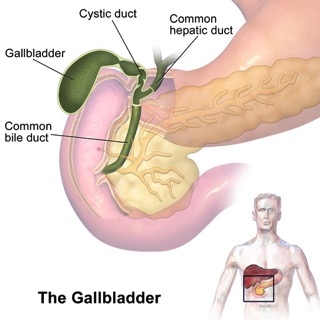
Gallbladder surgery is one of the most commonly performed surgeries today. Did you know simply going gluten-free may lower the risk of needing gallbladder surgery?
For people with celiac disease or gluten sensitivity, gluten triggers a wide range of adverse reactions, from joint pain to poor brain function. In the last several years, research has also linked gluten with gallbladder disease in gluten-sensitive individuals.
Gluten sensitivity largely undiagnosed
An astonishing number of people are gluten intolerant but do not know it. Undiagnosed gluten sensitivity can cause leaky gut, chronic pain, inflammation, neurological damage, and autoimmunity (when the immune system attacks and destroys body tissue). Gluten sensitivity is estimated to affect between 20 and 40 percent of the general population, and is less frequently identified than celiac disease, though this is changing.
How gluten can raise the risk of needing gallbladder surgery
So how can gluten raise the risk of requiring gallbladder surgery? The process begins with damage to the small intestine. This damage inhibits its ability to properly secrete a hormone called cholecystokinin. Cholecystokinin is the hormone that signals the gallbladder when it’s time to release bile, which aids in the digestion and absorption of fat. As a result, bile builds up in the gallbladder, causing inflammation and raising the risk of gallbladder disease and subsequent gallbladder surgery.
Approximately 60 percent of people with celiac disease “an autoimmune reaction to gluten” also have gallbladder, liver, or pancreatic conditions, and this is apparently one reason why.
Why you need a gallbladder
Although you can live without your gallbladder, it is essential to overall health. The bile stored and secreted by the gallbladder enables you to digest fats. Without a gallbladder, your liver still produces bile, but the bile just “leaks” continually into the small intestine. This means there are no adequate reserves of bile to break down fats when needed.
These fats then become rancid and inflame the digestive tract while fat-soluble vitamins and essential fatty acids are not properly absorbed. Ultimately, this compromises the function of your entire digestive tract. In fact, studies have linked gallbladder removal with an elevated risk of colon cancer.
Also, if the gallbladder is not removed but isn’t doing its job well, this can be detrimental to liver function.
It is worth caring for your gallbladder to preserve the health of your digestive system, and hence your immune system. If you are sensitive to gluten, it’s important to go gluten-free to maintain gallbladder health and lower your risk of needing gallbladder surgery.
Additionally, your gallbladder appreciates a diet high in omega 3 essential fatty acids, and free of processed oils and hydrogenated fats. And in general, it is safest to keep starchy carbs (cake, potatoes, white flour, refined sugar, etc.) to a minimum.
Various botanicals and nutrients can support liver and gallbladder health. They include milk thistle seed extract, dandelion root, ginger root, and phosphatidyl choline.
If you have already had your gallbladder removed, don’t despair. Taking ox bile with your meals can help you emulsify and absorb your fats, which are vital for many aspects of health including brain function. For more information, contact my office.





Latest from the Blog
Breaking Through Cancer Barriers: News Outlets Spotlight High-Dose Vitamin C Therapy
December 5, 2024https://www.yahoo.com/news/pancreatic-cancer-patient-survival-doubled-152722177.html Harnessing the Power of High-Dose Vitamin C in Cancer Treatment Recent advances in cancer treatment research have brought renewed attention to high-dose intravenous (IV) vitamin C, particularly in extending survival rates for patients with advanced different forms of cancer. A groundbreaking phase 2 clinical trial Study Finds demonstrated that combining high-dose IV vitamin C […] Read more
Latest from the Blog
The Dirty Dozen
The “Dirty Dozen” is a list of fruits and vegetables, compiled by the Environmental Working Group (EWG), that you should always eat organically. These produce items are not only delicious and nutrient-rich but also tend to carry high levels of pesticide residues when grown conventionally. By opting for organic versions, you can significantly reduce your […] Read more